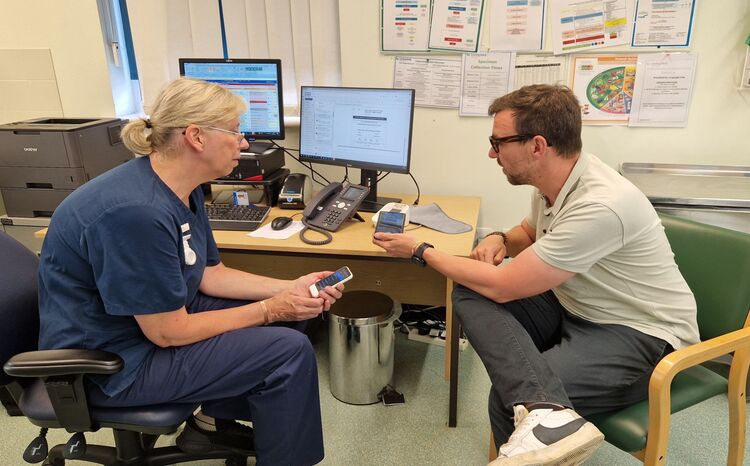Of primary importance: Masood Nazir on the value of digital
- 9 August 2018

In the first of a new column written exclusively for Digital Health, Dr Masood Nazir – clinical lead for NHS England’s primary care digital transformation programme, and CCIO at a large CCG – considers the potential of digital to improve experience for GPs and patients alike.
It’s an exciting time to be involved in NHS England’s primary care digital transformation agenda as it reaches out across the entire healthcare system.
As a GP I have always felt passionately that patients should be empowered to take more control of their healthcare through the effective sharing of information and use of innovative technology.
We all – including many of our patients – use technology in our lives when shopping, organising our holidays, and booking restaurants. I’m very keen to harness technology to improve the way in which we deliver GP services, not only for patients, but also to support my colleagues in managing the growing demand on practices.
As the national clinical lead for NHS England’s Primary Care Digital Transformation programme I am proud we have enabled over 14 million people going online to book appointments, order repeat prescriptions and view their health record. That’s nearly a quarter of the patient population.
The need for culture change
There is much work still to do for digital services to be recognised as an alternative form of access, supporting practices in managing their workload. That includes changing behaviour in using technology and supporting patients to become active partners in managing their care.
For this culture shift to happen we need to give practices and their staff the confidence and the tools to offer these online services to patients – and for them to encourage patients to keep using them.
Of course digital services need to add value too, and in general practice that’s already happening in reducing the burden on staff, so freeing up time to better serve patients.
It’s been proved that just a small reduction in calls or visits to the surgery can make a difference. For example, signing up just two extra patients a day to use online services could save a practice more than 30 hours a year.
Vital collaboration
It is also about working collaboratively with others across primary and secondary care, helping to improve communication over all care settings. I was recently appointed chief clinical information officer (CCIO) for the largest CCG in the country, Birmingham and Solihull. We have over a million GP patient records, available to six provider organisations in Birmingham, Solihull and Sandwell, making it easier for colleagues to provide safer, more informed care for their patients – as well as being a good example of that collaborative working.
Sharing information allows those looking after patients to take responsibility for providing care, rather than referring them on or back without any changes to their management/treatment plans.
There is a huge amount of innovative and interesting work taking place across the digital agenda, which I’ll be sharing with you over the coming months.
Dr Masood Nazir is national clinical lead for NHS England’s Primary Care Digital Transformation team. He qualified as a doctor in 1997 and moved into general practice in 2001. He is a partner at Hall Green Health, a large, diverse practice in South Birmingham.





4 Comments
Crucial to understand the system as a whole and then to evaluate what adds value and why. Repeat prescriptions – definitely a major step forward. Access to records for patients – useful, but only a minority of patients are interested. Online booking of appointments – hmm. The issue is not booking them, but availability, and online does nothing for this. In fact may worsen the problem as the digitally on the ball get the scarce appointments, not based on need. No, the high value route is to get the patients to seek help online, and let the GPs decide how to help.
Agree with you Masood that there are exciting times ahead. I look forward to hearing more about the plans.I also think that there needs to be in place alongside the changes research to look at the impact. Researchers like Helen Atherton are excellent and I think we need to do more to understand what is happening on the frontline for both patients and staff in primary care and to see what really makes a difference for them.
In general, IT services are adopted by practices and patients when they find them useful: that’s why GPs were early adopters of EPRs (especially for registration and repeat prescribing) but secondary care was not to the same extent.
Transactional services – ordering repeat prescriptions, making & cancelling appointments, registering patients – have been a feature of GP systems since well before 2013 – and even before Connecting for Health!
As has patient record access.
Making GP records accessible to other parts of the NHS is much more difficult: even when you know the GP system in which the EPR was generated, differences between practices in how they record clinical details, how much they Code as opposed to entering in free text, how correspondence is managed (& whether information from letters, past and current, is incorporated into the EPR) can make life difficult for locums in the practice – let alone secondary and community care HCPs without experience of GP systems!
With the NCRS, when Tony Blair wanted the record of a patient from Birmingham who broke his/her leg in Brighton to be instantly available in A&E, I had a vision of the electronic version of one of my 10 volume Lloyd George patient records arriving on the A&E doctor’s desk…
I would be really interested to know how this problem is being addressed when GP records (which will be incomplete, and probably contain inaccuracies) are shared with secondary or community care in Birmingham or Solihull
We are still being told to try the same.
However with tech these days it would be easier for Birmingham A+E to view the record in Brighton. No need to access the record via the GP system but no doubt we will be expected to do this..
Comments are closed.